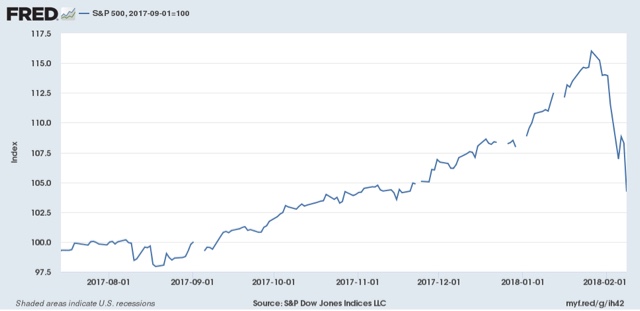- by New Deal democrat
So the stock market is down 10% as of this writing, which takes us all the way back to --- three months ago!
Really? This is what you're worried about?
A little context. Here's a graph of the S&P 500, normed to 100 as of September 1, 2017:
The market went up 16% in 5 months, or +.75% each and every week. That translates into an annual rate of +48%! A 48% annual gain coming out of a recession isn't a big deal. Coming 9 years into a bull market, that, dear reader, is a blowoff.
Even if you figure that corporate profits were going to be up 5% YoY this year, and even if you figure that the recent tax cut for corporations was going to add 10% to that -- well, the market added all of that in already, didn't it?
And now that froth has been poured off.
To reiterate, the vast majority of other leading indicators, both long and short, are inconsistent with a recession starting in the next 3 to six months. Just this week, the Senior Loan Officer Survey, the JOLTS report, and initial jobless claims all pointed to continued expansion. As did last week's ISM manufacturing new orders numbers, as do the regional Fed reports, as do mortgage applications, as do the recent monthly housing reports.
If the vast majority of data says we're not heading into recession, then it is very, very unlikely that this correction is going to turn into something long-lasting.
In the last few days, I've gotten pushback that good leading indicators are bad, because they must be close in time to a bottom. Nonsense!
Let me introduce you to Lee Adler at the Wall Street Examiner, who wrote:
Record low claims are the patina of policy success .... These record claims represent a bubble that was born out of and is joined at the hip with the financial engineering bubble that has been metastasizing in the US economy for a generation.Just one problem: this quote comes from November 2015, when initial jobless claims were averaging 270,000 per week.
See the problem?
In my opinion, If you are middle or working class, and you have some money in the market via a 401k or similar, and you can't stand a 10% downturn, then you shouldn't be in the market at all, but rather devote that money to a cash-type of portfolio that allows you to sleep at night and not worry about your future. One rule of thumb I set for myself way back 25 years ago when I first got interested in this stuff, is what I called "the Turtle Method," as in turtle vs. hare. That rule of thumb was that, for every month's expenses I had saved, I could invest 1% of my assets. So if I had 10 months of savings, I could invest 10% of my total assets. That way I could sleep at night.
Bottom line: there are a lot of major problems in this country right now. How the economy is doing isn't one of them, and that is very unlikely to change in the next 3-6 months.
Bottom line: there are a lot of major problems in this country right now. How the economy is doing isn't one of them, and that is very unlikely to change in the next 3-6 months.
